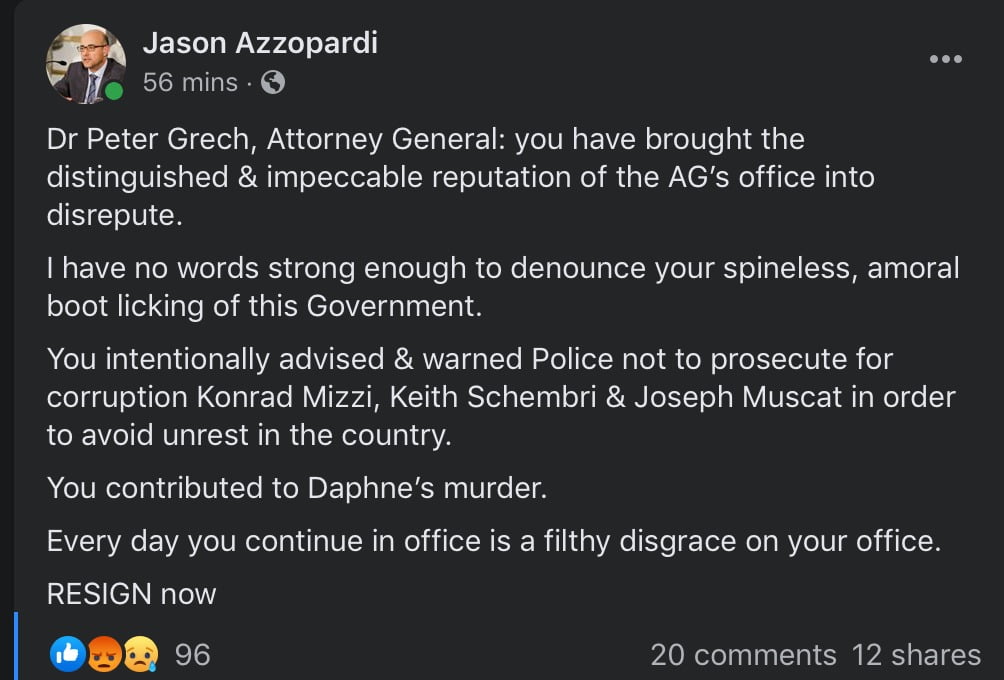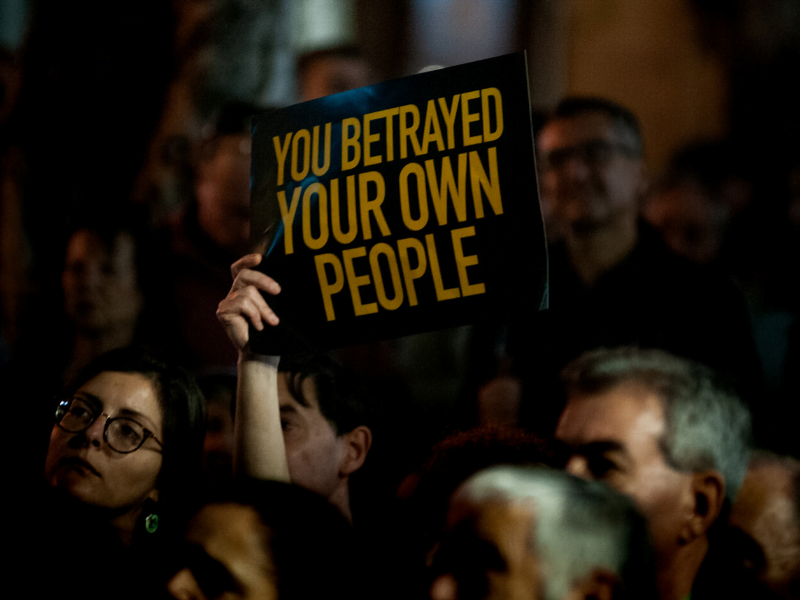The second testimony of Ian Abdilla, the former head of the police’s economic crimes unit, before a Board of public inquiry revealed the sheer lack of action from his end to investigate the former chief of staff Keith Schembri and any of the major scandals that hit Malta over the past years.
Abdilla’s failure to take action was called out several times by the three judges sitting on the Board which is looking into the investigation into the assassination of journalist Daphne Caruana Galizia.
The Board asked Abdilla several hard-hitting questions to explain the economic crime unit’s actions to investigate Schembri and his involvement in the Panama Papers, which led to Abdilla admitting that he did not call in the former chief of staff or former minister Konrad Mizzi for questioning. This answer drew a quick reaction from the judges.
“How could you not send for Keith Schembri and Konrad Mizzi?” Judge Abigail Lofaro asked him point blank. Abdilla had nothing to say.
Complete silence.
This was the only response the (sacked) Head of Economics Crimes Unit Ian Abdilla could give judges today when asked why @keithaschembri + @KonradMizzi were never even questioned by police on the #PanamaPapers scandal.
Let our institutions work, they told us. pic.twitter.com/6VPgSYOFpF
— David Casa (@DavidCasaMEP) July 1, 2020
Abdilla was harshly criticised for inaction on revelations in the Panama Papers, Pilatus Bank, 17 Black and Schembri. He was removed from his role last week by newly appointed police commissioner Angelo Gafa’.
Abdilla also had to admit to the Board that he did not send letters rogatory to the Panama authorities, requesting information after the scandal broke, which stunned the judges.
It is now clear from Abdilla’s testimony that as journalists were facing one libel case after another for reporting on the evidence at the time, the police were sitting on the information. Meanwhile, those involved repeated the line “where is the evidence?” as those revealing the scandal became targets.
The Board was incredulous that the man who pulled the strings, Joseph Muscat’s chief of staff, was not called in for questioning.
Lawyer Jason Azzopardi, one of the lawyers representing the Caruana Galizia family, said the police had been warned by the Attorney General not to prosecute Mizzi, Schembri and Muscat “to avoid civil unrest”.
Bombshell revelation in Public Inquiry on the assassination of #DaphneCaruanaGalizia. The AG warned in writing & advised Police not to prosecute Joseph Muscat, Konrad Mizzi,Keith Schembri after Panama Papers to avoid civil unrest. @PNmalta @repubblikaMT @EPPGroup @PieterOmtzigt
— Jason Azzopardi (@AzzopardiJason) July 1, 2020
Azzopardi also uploaded a post on Facebook, in which he called for the resignation of Attorney General Peter Grech saying he had brought the office into disrepute, calling him “spineless and amoral”.
As Abdilla’s testimony continued behind closed doors, Azzopardi revealed that the Attorney General had warned the police not to prosecute Muscat, Mizzi and Schembri to avoid civil unrest. “You contributed to Daphne’s murder,” the lawyer charged.
The Attorney General issued a statement soon after in which he categorically denied “an outright lie and calumny” made on Facebook and attributed to the Public Inquiry Board by Azzopardi to the effect that the Attorney General gave written advice “warning police to go slow on this investigation as it will cause trouble in the country”.

During his testimony, Abdilla was also grilled about the delayed action taken with regards to Pilatus Bank, especially after footage emerged of the owner Ali Sadr Hasheminejad leaving the bank with a briefcase in the middle of the night.
The judges pointed out that the police should have contacted and verified with Ali Sadr what had happened that night and not let it just pass by.
He tried to defend himself by stating that officers were stationed around the bank late at night soon after the first allegations were made by Caruana Galizia on her blog about Egrant – the third Panana company revealed in the scandal.
Abdilla attempted to reassure the Board that they had taken all the necessary steps to ensure that no data was deleted from the bank’s servers. Therese Commodini Cachia, also representing the Caruana Galizia family, pointed out that the police took over the bank’s data one year after receiving the first report.
The judges pressed Abdilla to give a clear reply as to whether he had interrogated Schembri in connection with Pilatus Bank. He first said that he did not remember but soon after admitted that he had not.
This is not the only issue on which Abdilla changed his version of events during his testimony on Tuesday. When asked by the Board whether he felt there was an urgency to investigate Schembri and his links to Pilatus Bank, Abdilla said: “When we received the first report about Keith Schembri we almost found nothing criminal.”
Just when I think my capacity to be shocked has reached maximum – I am reminded that the depths to which the disgraced #Malta Labour (@TheProgressives) administration has sunk to may well be limitless.
They let the criminals take over & then they covered up for them. For years. https://t.co/dOrz9KxwDC
— Roberta Metsola (@RobertaMetsola) July 1, 2020
Following a strong reaction from the judges, Abdilla was quick to clarify that things were different with hindsight and that it was listed as a “loan”. Abdilla was referring to two payments of €50,000 from Nexia BT’s Brian Tonna to Schembri’s account, which they claimed was a loan repayment, denying allegations that it was kickback from the passport scheme. This is the subject of a magisterial inquiry that has not yet seen the light of day after more than two years.
Abdilla also retracted a statement in his previous testimony before the Board where he said that the authorities in Dubai were cooperating with Malta’s request for information about 17 Black, the company owned by Yorgen Fenech. Abdilla is now saying that Dubai was not cooperating and the authorities there had shifted the dates three times before cancelling the meeting.
He also said the police had not sent letters rogatory to the Montenegrin authorities for information about corrupt energy deal involving the Mozura windfarms following revelations that Fenech of kickbacks through the involvement of 17 Black and the same cast of characters involved in the corrupt Electrogas deal.












